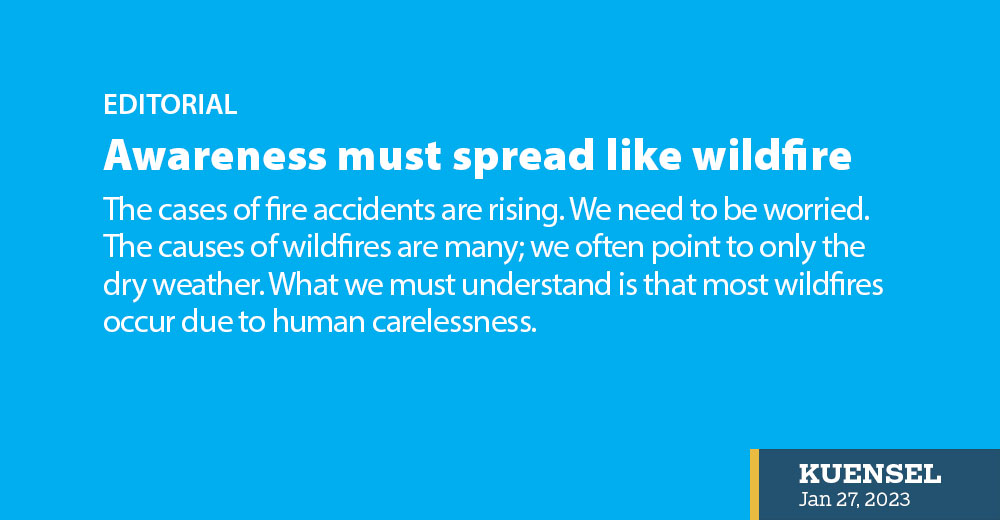The cases of fire accidents are rising. We need to be worried.
The causes of wildfires are many; we often point to only the dry weather. What we must understand is that most wildfires occur due to human carelessness.
According to a global study, improperly extinguished campfires, unsmothered cigarette butts, arson, and improperly burnt debris are responsible for about 85 percent of wildfires.
There have been more than 1,400 forest fire incidents in Bhutan in 10 years. We also know that about 99 percent of fires were anthropogenic (originating due to human activity) in nature and occurred during the winter.
In Bhutan, though, the problem is not just wildfires. Fires breaking out in the rapidly growing settlements are even more serious. The way the settlements are growing in the peripheries of our towns is worrying.
We conveniently blame fire incidents on short circuits! If short circuit is the main cause of fires, it should not be intractable to nip the problem in the bud. Unprofessional wiring is the greatest danger in the country today.
We know where the buck must stop, but duplication of responsibilities is opening up gaps that are becoming wider by the day. We cannot blame our firefighters because they can do only so much if we continue to be careless.
We have laws that are supposed to prevent such unfortunate incidents. The Forest and Nature Conservation Act 1995 prohibits any fire in government forests, irrespective of forest type and vegetation sensitive to fire. The National Forest Policy of Bhutan 2011 prohibits fire in fire-sensitive ecosystems but allows the use of fire as a management tool in fire-adapted ecosystems.
These measures, however, are not enough, because they are pockmarked with gaps.
In 2017, under the Royal Command, the first interagency SOP was formulated and various unitiatives were implemented in Thimphu. Under this arrangement, an Interagency Forest Fire Coordinating Group was formed for Thimphu, consisting of members from the authorities concerned.
Every dzongkhag, town, and village must have groups at the ready, especially in the winter when the threat is high.
Prime Minister Dr Lotay Tshering said recently: “As much as it is an individual responsibility, it is also on the government to render all possible assistance. For the homes, we must ensure the quality of wiring and appliances, availability of electricians in that community, professionalism of the technicians and adherence to minimum standards.”
The ongoing skilling programmes for the village electricians, carried out by agencies like BPC, must be intensified.
We can surely cut down on the cost of fire safety uniforms and equipment. What is urgently needed is safety awareness that must spread like wildfire.


